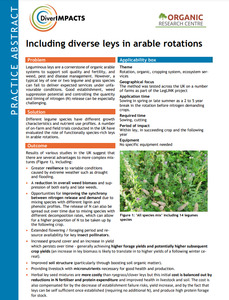{Tool} Including diverse leys in arable rotations (DiverIMPACTS Practice Abstract). Creator(s): Bliss, Katie and Measures, Mark. Issuing Organisation(s): ORC - Organic Research Centre. (2022)
|
PDF
- Published Version
- English
289kB | |
![[thumbnail of 2022-09-12 13_09_31-Diverse fertility building leys in arable rotations.png]](/44457/2.hassmallThumbnailVersion/2022-09-12%2013_09_31-Diverse%20fertility%20building%20leys%20in%20arable%20rotations.png)  Preview |
Image (PNG)
- Cover Image
- English
257kB |
Document available online at: https://zenodo.org/record/6241557#.Yx8QanZByUk
Summary in the original language of the document
Results of various studies in the UK suggest that there are several advantages to more complex mixtures, including: 1) Greater resilience to variable conditions caused by extreme weather such as drought and flooding; 2) A reduction in overall weed biomass and suppression of both early and late weeds; 3) Opportunities for improving the synchrony between nitrogen release and demand due to mixing species with different lignin and phenolic profiles. The release of N can also be spread out over time due to mixing species with different decomposition rates, which can allow for a higher proportion of N to be taken up by the following crop; 4) Extended flowering / foraging period and resource availability for key insect pollinators; 5) Increased ground cover and an increase in yield which persists over time - generally achieving higher forage yields and potentially higher subsequent crop yields (an increase in ley biomass is likely to translate in to higher yields of a following winter cereal); 6) Improved soil structure (particularly through boosting soil organic matter); 7) Providing livestock with micronutrients necessary for good health and production; 8) Herbal ley seed mixtures are more costly than ryegrass/clover leys but this initial cost is balanced out by reductions in N fertiliser and protein expenditure and improved health in livestock and soil. The cost is also compensated for by the decrease of establishment failure risks, yield increase, and by the fact that leys can be self sufficient once established (requiring no additional N), and produce high protein forage for stock.
Summary translation
Die Ergebnisse verschiedener Studien im Vereinigten Königreich deuten darauf hin, dass komplexere Mischungen mehrere Vorteile bieten, darunter: 1) Größere Widerstandsfähigkeit gegenüber schwankenden Bedingungen, die durch extreme Witterungsbedingungen wie Trockenheit und Überschwemmungen verursacht werden; 2) Verringerung der Gesamtbiomasse von Unkraut und Unterdrückung von frühem und spätem Unkraut; 3) Möglichkeiten zur Verbesserung der Synchronisation zwischen Stickstofffreisetzung und -bedarf durch die Mischung von Arten mit unterschiedlichen Lignin- und Phenolprofilen. Die Freisetzung von Stickstoff kann durch die Mischung von Arten mit unterschiedlichen Zersetzungsgeschwindigkeiten auch zeitlich gestreckt werden, wodurch ein höherer Anteil des Stickstoffs von der nachfolgenden Kultur aufgenommen werden kann; 4) Verlängerte Blüte-/Futterzeit und Ressourcenverfügbarkeit für wichtige Bestäuberinsekten; 5) Erhöhte Bodenbedeckung und eine Ertragssteigerung, die über einen längeren Zeitraum anhält - was im Allgemeinen zu höheren Futtererträgen und potenziell höheren Erträgen der nachfolgenden Kulturen führt (eine Erhöhung der Biomasse des Laubes führt wahrscheinlich zu höheren Erträgen des nachfolgenden Wintergetreides); 6) Verbesserung der Bodenstruktur (insbesondere durch die Erhöhung der organischen Substanz im Boden); 7) Versorgung des Viehs mit Mikronährstoffen, die für eine gute Gesundheit und Produktion notwendig sind; 8) Saatgutmischungen für Kräuterheu sind teurer als Weidelgras-/Kleeheu, aber diese anfänglichen Kosten werden durch die Verringerung der Ausgaben für Stickstoffdünger und Eiweiß und die verbesserte Gesundheit von Vieh und Boden ausgeglichen. Die Kosten werden auch durch die Verringerung des Risikos von Misserfolgen bei der Etablierung, durch Ertragssteigerungen und durch die Tatsache kompensiert, dass sich die Grasnarben nach der Etablierung selbst versorgen können (sie benötigen keinen zusätzlichen Stickstoff) und hochwertiges Eiweißfutter für das Vieh liefern.
| EPrint Type: | Practice tool |
|---|---|
| Teaser: | Learn more about functionally species-rich leys in rotations. |
| What problem does the tool address?: | Leguminous leys are a cornerstone of organic arable systems to support soil quality and fertility, and weed, pest and disease management. However, a typical ley of one or two legume and grass species can fail to deliver expected services under unfavourable conditions. Good establishment, weed suppression potential and controlling the quantity and timing of nitrogen (N) release can be especially challenging. |
| What solution does the tool offer?: | Different legume species have different growth characteristics and nutrient use profiles. A number of on-farm and field trials conducted in the UK have evaluated the role of functionally species-rich leys in arable rotations. |
| Country: | United Kingdom of Great Britain and Northern Ireland |
| Type of Practice Tool: | Practice abstracts |
| Keywords: | crop rotations, legumes, leys, diversification |
| Agrovoc keywords: | Language Value URI English crop rotation http://aims.fao.org/aos/agrovoc/c_6662 English legumes http://aims.fao.org/aos/agrovoc/c_4255 English UNSPECIFIED UNSPECIFIED English diversification http://aims.fao.org/aos/agrovoc/c_2344 |
| Subjects: | Crop husbandry > Crop combinations and interactions Crop husbandry > Production systems > Cereals, pulses and oilseeds Environmental aspects > Biodiversity and ecosystem services |
| Research affiliation: | European Union > Horizon 2020 > Diverimpacts UK > Organic Research Centre (ORC) European Union > Organic Farm Knowledge |
| Horizon Europe or H2020 Grant Agreement Number: | 727482 |
| Related Links: | https://organic-farmknowledge.org/tool/44457, https://www.facebook.com/organicfarmknowledge/posts/pfbid0xAfMuDH4m3pCL7WCLmGacRPA7E7bnUPqBvGBxurChJKiawvHbvBgzgjCqj19BV8cl, https://twitter.com/farm_knowledge/status/1646514802037227527 |
| Project ID: | OFK |
| Deposited By: | Rüger, Madelaine Lea |
| ID Code: | 44457 |
| Deposited On: | 19 Sep 2022 14:22 |
| Last Modified: | 02 May 2024 10:31 |
| Document Language: | English |
| Status: | Published |
Repository Staff Only: item control page

 Download Statistics
Download Statistics Download Statistics
Download Statistics
